particularly in science studies, have had to be greatly extended or recast. The many admirable scientific schools and colleges throughout the country have made demands for special preparation that have had to be met. Furthermore, it has come to pass that the college prerequisites in the old classical studies even have been very considerably increased. Altogether it may be stated that the demands made upon the preparatory schools to-day are probably at least twenty-five or thirty per cent in excess of the demands of twenty-five or thirty years ago. Coincident with this multiplication and extension of preparatory studies, there has arisen in our country a sentiment which to no inconsiderable extent has reduced the hours devoted to study. A few decades since a boy fitting for college with its limited requirements in Latin, Greek, and mathematics, spent six hours per diem in school, and, as a matter of course, expected to give two, three, or possibly more hours to study at home. Now, he spends four or five hours in the school-room; and the sight of a text-book under his arm as he idly saunters homeward excites comment in the community as to the severe mental strain to which school-children are nowadays subjected by rigorous masters.
The result of all this is a state of affairs to which President Eliot, of Harvard University, has recently invoked the serious attention of the American public[1] He states that the average age of admission to Harvard University has been gradually rising for many years, and has now reached the extravagant age of eighteen years and ten months. He also notes that in view of the increased time required for the completion of his professional education, after leaving college, it follows that a man, thoroughly preparing himself for life, finds himself unprepared for self-support much before he is twenty-seven years old. This result is by no means peculiar to Harvard or to Harvard graduates, but holds true as to all colleges in the United States. Its remedy, in the opinion of President Eliot, is in both shortening and enriching our secondary school courses of study. As illustrating what other countries have succeeded in doing in this direction, he cites the school courses of France. The hours of recitation of these courses, less elaborate and difficult than those of Germany, are, he claims, so far as hours of recitation are concerned, substantially the same as those of this country; yet, under them, the French boy is better prepared for matriculation at seventeen years of age than ours are at nineteen. He therefore calls for a serious examination of the programmes of l'enseignement secondaire classique of France in comparison with the programmes of American preparatory
- ↑ A paper read before the Department of Superintendence of the National Educational Association at Washington, February 16, 1888, published in the Atlantic Monthly, August, 1888. Remarks before the Commercial Club, Providence, R. I., March, 1889.

